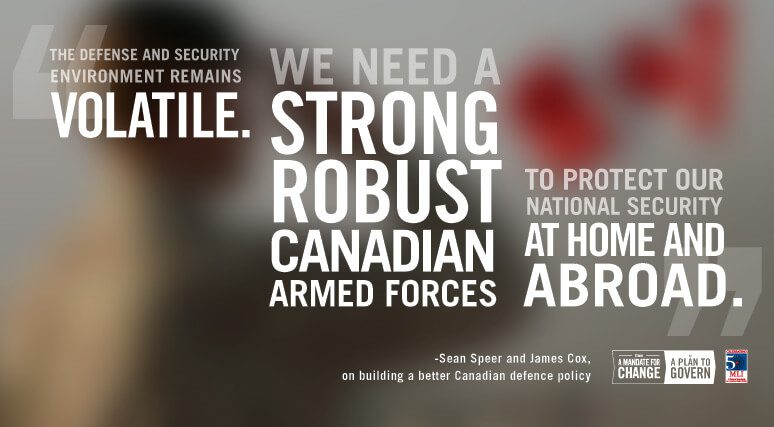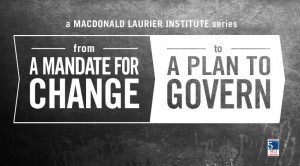 What steps can the federal government take to craft a strong, robust, long-term defence policy?
What steps can the federal government take to craft a strong, robust, long-term defence policy?
OTTAWA, Jan. 29, 2016 – Canada exists in a dangerous world. Russian adventurism is threatening democratic governments in eastern Europe. ISIS is terrorizing Iraq and Syria. New threat such as cyber terrorism are emerging.
The need for a robust defence policy has never been more apparent – which is why the Macdonald-Laurier Institute is outlining steps the government can take to put national defence policy on a strong footing.
The new commentary, authored by MLI Senior Fellow Sean Speer and retired Brigadier-General James Cox, urges the new Liberal government to use its upcoming review of defence policy to take a step back from deciding which fighter jet it should buy or what its role in Iraq should be.
Instead, they say, the government should ask a more fundamental questions: What is the role of the Canadian Armed Forces? What considerations will dictate their deployment? What is the most effective role Canada can play in the world?
Only by deciding on firm policy objectives can the government build a plan for allocating the right amount of money and buying the appropriate equipment to reach those goals.
 “The world is a dangerous place and we need a strong, robust Canadian Armed Forces to protect our national strategy at home and abroad”, write Speer and Cox.
“The world is a dangerous place and we need a strong, robust Canadian Armed Forces to protect our national strategy at home and abroad”, write Speer and Cox.
The authors then set out some common-sense recommendations to put the government’s eventual defence policy on a strong footing. In particular, the essays focuses on three key priorities: strategic prioritization, predictable funding, and more effective and efficient procurement processes.
“Financial resources should be directed to a few key priorities instead of simply buying a little less of everything”
To read the full commentary, click here.
Prioritization
Foreign policy debate in Canada is so consumed by tactical questions – the decision about the F-35 fighter jet purchase, the bombing campaign against ISIS – that strategic decision-making often takes a back seat.
That proved problematic for the previous government. Its defence policy document, the Canada First Defence Strategy (CFDS), failed to prioritize. That meant the government found it difficult to focus on the really important areas as budgets tightened.
“Financial resources should be directed to a few key priorities instead of simply buying a little less of everything”, write Speer and Cox.
Proper funding
While prioritization will help make the most of scarce funds, restoring funding levels for defence will be important.
 The previous government recognized the importance of stable funding, committing to detailed financial promises as part of the CFDS. But that money quickly evaporated due to the financial crisis, budget cuts and procurement delays.
The previous government recognized the importance of stable funding, committing to detailed financial promises as part of the CFDS. But that money quickly evaporated due to the financial crisis, budget cuts and procurement delays.
This significantly reduced the amount of money available for the Department of National Defence to spend on acquiring the right equipment.
It will be up to the new government, the authors say, to make the tough choices to get defence spending back on track.
Fixing procurement
Allocating money is one thing. Actually making sure it’s spent is another.
For years procurement problems have left unspent millions of dollars that were supposed to be used on tanks, planes and other equipment for the Canadian military.
“The system needs more procurement experts, increased access to training and professional development, and retention of trained personnel in key positions”
Cox and Speer urge the government to re-invest in its procurement workforce. The number of big and complex projects has increased over the last decade, while the workforce did not.
As a result, fewer people are working on more complex projects than in the past.
“The system needs more procurement experts, increased access to training and professional development, and retention of trained personnel in key positions”, write the authors.
This paper is the latest entry in MLI’s series, From A Mandate For Change To A Plan To Govern.
The series, which is publishing weekly from the Throne Speech to the first budget this spring, is designed to offer practical policy recommendations that help the newly-elected government follow through on its election promises.
* * *
Brigadier-General (Retired) Dr. James (Jim) S. Cox completed a 35-year military, mainly in operationally oriented command and staff positions across Canada and on five continents.
Sean Speer is a Senior Fellow at the Macdonald-Laurier Institute. He previously served in different roles for the federal government including as senior economic advisor to the Prime Minister and director of policy to the Minister of Finance.
The Macdonald-Laurier Institute is the only non-partisan, independent national public policy think tank in Ottawa focusing on the full range of issues that fall under the jurisdiction of the federal government.
For more information, please contact Mark Brownlee, communications manager, at 613-482-8327 x105 or email at mark.brownlee@macdonaldlaurier.ca.




